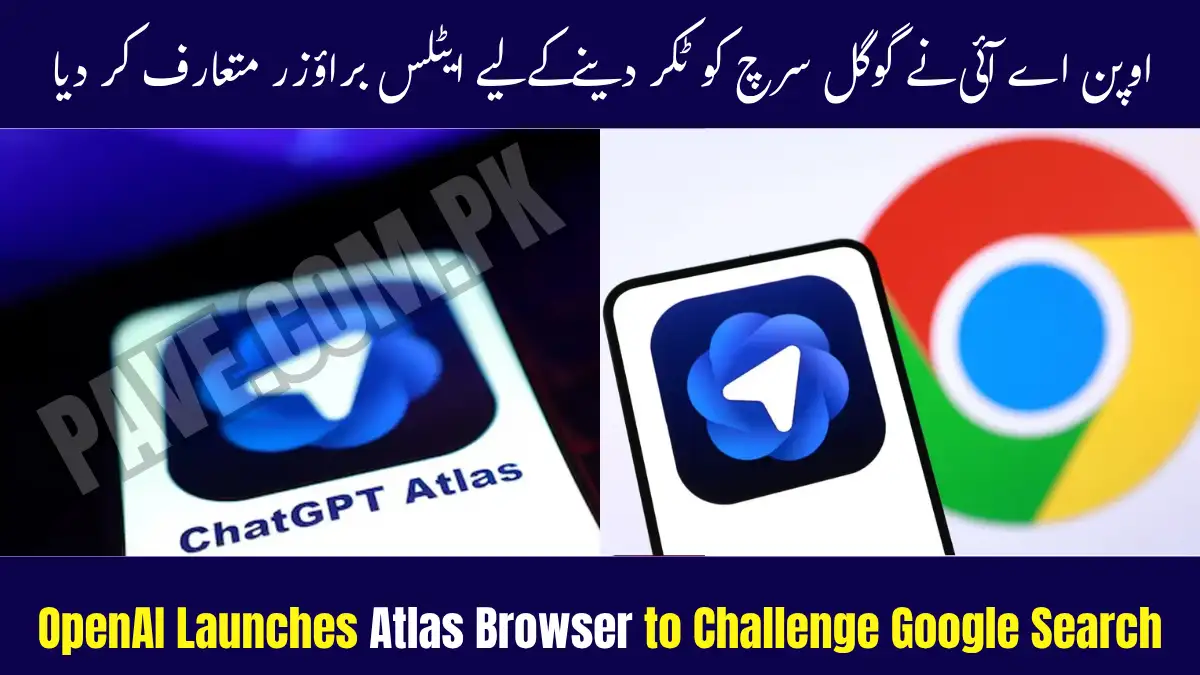OpenAI Launches Atlas Browser to Challenge Google Search
In a move that could redefine the future of the internet, OpenAI has officially launched its AI-powered web browser, Atlas, marking a direct challenge to Google Search and the dominance of the Chrome ecosystem. The new browser, known as OpenAI Atlas Browser, merges artificial intelligence, automation, and personalized browsing to create an entirely new kind of online experience — one where users converse, not just click.
This launch represents one of the boldest steps yet in OpenAI’s ongoing expansion beyond chat-based AI and into the everyday digital lives of millions. It also signals a pivotal shift in how people might search for and consume information — a shift from traditional keyword-based results to AI search engine 2025 models powered by understanding, reasoning, and real-time synthesis.
What Is Atlas Browser?
The Atlas browser is OpenAI’s new intelligent web platform designed around its flagship model, ChatGPT, which already serves over 800 million weekly users worldwide. Unlike conventional browsers such as Google Chrome, Firefox, or Edge, Atlas isn’t just a window to the internet — it’s a smart assistant embedded within it.
Atlas allows users to open any website while simultaneously engaging ChatGPT in a sidebar or floating panel. Instead of manually scrolling, copying, or switching tabs, the AI can read pages, summarize key points, compare products, or even carry out entire workflows automatically.
For example, a user planning a trip can simply ask:
“Atlas, find me the best 3-day itinerary in Istanbul under $500,”
and the browser — through its Agent Mode — will analyze multiple sources, compile personalized results, compare flight and hotel options, and even book reservations, all without leaving the interface.
This seamless integration of search, summarization, and automation represents a new era of web interaction, one that redefines what a browser can do.
How Atlas Challenges Google Search
The most direct implication of the OpenAI Launches Atlas Browser to Challenge Google Search announcement is its potential to disrupt Google’s long-held monopoly on information discovery.
Google Search has traditionally relied on indexing websites and ranking results based on keywords, backlinks, and advertising models. Atlas, however, bypasses this system entirely. Instead of showing a list of blue links, Atlas provides synthesized answers in conversational form, supported by citations and data references.
This approach could dramatically alter user behavior. If people can get reliable, summarized answers directly from AI rather than clicking through multiple websites, the need for traditional search pages — and the ads that fund them — may diminish.
Industry analysts already predict that Google vs OpenAI will become the defining competition of the next digital decade, similar to the Apple vs Microsoft battle that shaped personal computing.
A 1.8% drop in Alphabet’s (GOOGL.O) stock price following Atlas’ launch reflects growing investor awareness of how this new paradigm might reshape the online advertising landscape.
Read More: SnapChat Down Globally Due to Amazon AWS Outage Today
Atlas Browser Features: A Deep Dive
The Atlas AI browser features go far beyond voice or text commands. OpenAI has designed it to feel like a digital partner that thinks, reasons, and acts. Here’s a detailed look at what makes it unique:
1. AI-Powered Sidebar
Users can activate ChatGPT within any tab to summarize web content, extract key data, generate reports, or explain complex information in simple language.
2. Agent Mode (Automation Mode)
In this feature, Atlas can interact with websites autonomously. From filling online forms to managing spreadsheets or performing research, the AI can complete multi-step tasks end-to-end.
3. Smart Search Integration
Instead of relying on external search engines, Atlas integrates AI search engine 2025 technology that directly retrieves and synthesizes information from across the web.
4. Real-Time Data Analysis
Atlas can read charts, extract tables, and interpret trends directly from web pages, making it invaluable for professionals and students alike.
5. Privacy and Control
OpenAI emphasizes that Atlas operates under a privacy-first model. Users can enable incognito AI mode, preventing any browsing history or personal data from being used for model training.
6. Seamless Multi-Device Sync
The browser syncs user preferences, prompts, and bookmarked AI chats across devices using cloud encryption — creating a continuous, personalized browsing experience.
7. Developer & API Support
Developers will be able to integrate custom GPTs, plugins, and automation scripts directly into the browser, allowing businesses to build AI-native workflows within Atlas.
Why Atlas Is a Threat to Google
OpenAI’s decision to embed conversational AI inside the browser itself is what makes Atlas such a formidable competitor to Google Search and Chrome.
Google’s traditional model depends on user engagement with search results — users type, click, and view ads. But in Atlas, users interact directly with the AI interface that summarizes and filters information for them.
If this model scales, OpenAI could become a new type of gatekeeper for online content — one that controls user attention and discovery, just as Google has for over two decades.
Furthermore, Atlas collects anonymized browsing behavior to improve contextual understanding. This allows it to anticipate user needs — for example, offering reminders, calendar integrations, or task management — without the user explicitly searching for them.
For Google, this represents more than just competition; it’s a paradigm shift. Chrome and Search rely on advertising revenue, but an AI-driven browser that reduces the need for clicks and ad impressions could undermine Google’s core business model.
The Future of AI Search and Browsing
The release of Atlas signals that AI search engine 2025 models are the future of how people interact with the web. Instead of typing keywords, users will increasingly describe what they need — and the AI will handle everything else.
For example, a student could ask Atlas to “summarize five peer-reviewed papers on renewable energy published in 2024,” and the browser would retrieve and condense relevant content instantly. Similarly, a small business owner could ask it to “draft a marketing plan based on my website analytics,” and the browser would analyze existing data and generate actionable strategies.
By integrating generative AI directly into the browsing core, OpenAI has positioned Atlas as the central hub of intelligent internet usage — combining search, creativity, and automation.
Read More: Amazon AWS Outage Disrupts Globally Causing SnapChat Down
Impact on Users: Why Atlas Matters
For everyday users, the OpenAI Atlas browser promises convenience, speed, and a dramatic reduction in cognitive load. Instead of navigating multiple tabs, copying information, or comparing sources manually, users can now rely on AI to do the heavy lifting.
Benefits include:
- Faster Access to Information: Instant summaries replace long search sessions.
- Productivity Boost: Automating repetitive online tasks saves time for professionals and students.
- Simplified Research: AI cross-references and validates information from multiple sources.
- Customization: Atlas learns user preferences and adapts results accordingly.
- Accessibility: Natural language interaction makes it ideal for users who struggle with technical browsing.
Moreover, its AI-native structure means Atlas can serve as both a search assistant and task manager, blurring the lines between a browser, productivity suite, and personal AI.
The Ecosystem Vision: Beyond Search
OpenAI’s new product launch is not just about releasing a browser — it’s about building a self-sustaining ecosystem where ChatGPT and Atlas coexist as part of a unified platform.
Users who already rely on ChatGPT for work, study, or entertainment can now transition seamlessly between conversation and action. Instead of copying ChatGPT outputs into other tools, Atlas can directly execute tasks within the same environment.
This integration hints at a long-term goal: turning Atlas into the foundation for a personal AI operating system, where browsing, productivity, and automation converge under one intelligent interface.
Industry Reaction and Market Implications
The tech world’s reaction has been swift. Analysts and AI researchers call Atlas the most disruptive browser launch since Chrome.
“Atlas changes the relationship between people and information,” said Maria Alvarez, a technology analyst at Global Insight. “It’s not just a browser — it’s an intelligent agent that understands your intent and delivers outcomes, not just results.”
Competitors like Google, Microsoft, and Apple are expected to respond quickly. Microsoft already integrates ChatGPT into Edge, but Atlas, owned directly by OpenAI, poses a unique challenge: it removes the intermediary and puts the AI at the center.
For content creators and advertisers, this transformation may require rethinking SEO strategies. When an AI reads and summarizes content, traditional ranking metrics become irrelevant. Instead, value may depend on factual accuracy, freshness, and trustworthiness — qualities that AI systems prioritize when generating responses.
Read More: Pakistan Professionals Adopting AI Tools Rapidly in 2025
User Reception and Early Performance
Early beta testers report that Atlas feels “alive, fast, and intuitive.” Its conversational tone, combined with precise data handling, creates an experience that feels closer to interacting with a digital assistant than using a conventional browser.
Feedback also highlights Atlas’s speed in summarizing lengthy documents and automating web research as standout features. For instance, professionals in journalism, law, and academia have found the ability to extract core insights from hundreds of pages within seconds “revolutionary.”
The integration of voice-based interactions and visual recognition is planned for future updates, allowing users to ask questions about images, charts, or videos directly through the browser interface.
The Beginning of a New Search Era
The OpenAI Launches Atlas Browser to Challenge Google Search marks a defining moment in the evolution of the web. With Atlas, browsing becomes conversational, intelligent, and action-driven — a radical departure from the static search model that has defined the internet for over two decades.
Whether Atlas can dethrone Google remains uncertain, but it has already redefined expectations. Users now see what’s possible when artificial intelligence is not just an add-on but the very core of the browsing experience.
As the world stands on the brink of a new AI-powered internet, Atlas could be the product that changes how humanity searches, learns, and works online — forever.







